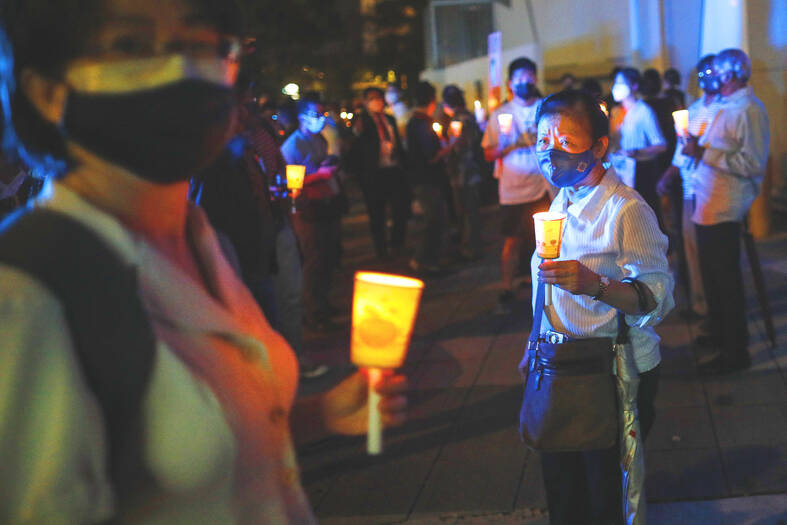A Singaporean man is scheduled to be hanged next week for conspiring to smuggle 1kg of cannabis in the city-state’s first execution in six months, rights groups said.
Tangaraju Suppiah, 46, would be executed on Wednesday, according to a notice from the Singapore Prison Service that was received by his family and posted on social media by rights advocates.
Amnesty International condemned the decision, calling it “extremely cruel.”

Photo: EPA-EFE
“If carried out, this execution would be in violation of international law and in stubborn defiance of continued outcry over Singapore’s use of the death penalty,” an Amnesty spokesperson said.
In many parts of the world — including in Thailand — cannabis has been decriminalized, with authorities abandoning prison sentences, and rights groups have been mounting pressure on Singapore to abolish capital punishment.
The city-state has some of the world’s toughest laws against the use and sale of narcotics, saying that the death penalty remains an effective deterrent against trafficking.
Tangaraju was convicted in 2017 of “abetting by engaging in a conspiracy to traffic” 1.0179kg of cannabis, twice the minimum volume that merits the death sentence.
He was sentenced to death in 2018, and the Singaporean Court of Appeal upheld the decision.
Prosecutors said he owned two mobile phone numbers used as contacts.
“What is especially troubling is that Tangaraju ... never actually handled the drugs,” human rights advocate Kirsten Han (韓俐穎) said. “He was also questioned by the police without legal counsel, and said that he was denied a Tamil interpreter.”
Singaporean High Court Judge Hoo Sheau Peng (符曉平) said that anyone who abets the commission of a crime under the law shall also be guilty of that offense and liable to the same punishment.
Hoo said that “the charge against the accused had been proved beyond a reasonable doubt.”
Singapore resumed execution by hanging in March last year, after a hiatus of more than two years.
Eleven executions were carried out last year — all for drug offences.
Among those hanged was Nagaenthran Dharmalingam, whose execution sparked a global outcry, including from the UN and British billionaire Richard Branson, because he was deemed to have a mental disability.
The UN says that the death penalty has not proven to be an effective deterrent globally and is incompatible with international human rights law, which only permits capital punishment for the most serious crimes.

A magnitude 5.6 earthquake struck off the coast of Yilan County at 12:37pm today, with clear shaking felt across much of northern Taiwan. There were no immediate reports of damage. The epicenter of the quake was 16.9km east-southeast of Yilan County Hall offshore at a depth of 66.8km, Central Weather Administration (CWA) data showed. The maximum intensity registered at a 4 in Yilan County’s Nanao Township (南澳) on Taiwan’s seven-tier scale. Other parts of Yilan, as well as certain areas of Hualien County, Taipei, New Taipei City, Taoyuan, Hsinchu County, Taichung and Miaoli County, recorded intensities of 3. Residents of Yilan County and Taipei received

Taiwan has secured another breakthrough in fruit exports, with jujubes, dragon fruit and lychees approved for shipment to the EU, the Ministry of Agriculture said yesterday. The Animal and Plant Health Inspection Agency on Thursday received formal notification of the approval from the EU, the ministry said, adding that the decision was expected to expand Taiwanese fruit producers’ access to high-end European markets. Taiwan exported 126 tonnes of lychees last year, valued at US$1.48 million, with Japan accounting for 102 tonnes. Other export destinations included New Zealand, Hong Kong, the US and Australia, ministry data showed. Jujube exports totaled 103 tonnes, valued at

TRUST: The KMT said it respected the US’ timing and considerations, and hoped it would continue to honor its commitments to helping Taiwan bolster its defenses and deterrence US President Donald Trump is delaying a multibillion-dollar arms sale to Taiwan to ensure his visit to Beijing is successful, a New York Times report said. The weapons sales package has stalled in the US Department of State, the report said, citing US officials it did not identify. The White House has told agencies not to push forward ahead of Trump’s meeting with Chinese President Xi Jinping (習近平), it said. The two last month held a phone call to discuss trade and geopolitical flashpoints ahead of the summit. Xi raised the Taiwan issue and urged the US to handle arms sales to

BIG SPENDERS: Foreign investors bought the most Taiwan equities since 2005, signaling confidence that an AI boom would continue to benefit chipmakers Taiwan Semiconductor Manufacturing Co’s (TSMC, 台積電) market capitalization swelled to US$2 trillion for the first time following a 4.25 percent rally in its American depositary receipts (ADR) overnight, putting the world’s biggest contract chipmaker sixth on the list of the world’s biggest companies by market capitalization, just behind Amazon.com Inc. The site CompaniesMarketcap.com ranked TSMC ahead of Saudi Aramco and Meta Platforms Inc. The Taiwanese company’s ADRs on Tuesday surged to US$385.75 on the New York Stock Exchange, as strong demand for artificial intelligence (AI) applications led to chip supply constraints and boost revenue growth to record-breaking levels. Each TSMC ADR represents